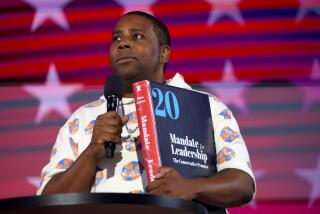Wife of legislator trying to save redevelopment agencies works for developer who favors program
Reporting from Sacramento — State Sen. Bob Huff, who is working aggressively to save California’s redevelopment agencies, says Gov. Jerry Brown’s plan to abolish them is legally dubious, would cost jobs and would eliminate one of the state’s few tools for spurring economic development.
What the Diamond Bar Republican doesn’t include in his pitch is that his wife is a paid consultant for a large developer eager to keep the program intact.
The developer, Ed Roski Jr., owner of Majestic Realty, has industrial and commercial properties across Southern California, many of them in redevelopment zones that have been spruced up with tax dollars.
Roski’s latest project is a proposed 75,000-seat NFL stadium in the City of Industry. It would not lie in a redevelopment area but would be next to one. Redevelopment subsidies could be used to upgrade nearby infrastructure and lure other businesses to the area, potentially boosting the viability of the stadium project.
Brown’s campaign to shut down redevelopment agencies and direct $1.7 billion of their funds to help balance the state budget has stalled in Sacramento at the hands of Republicans, with Huff as their point man. GOP leaders call their proposal to save the agencies the “Huff compromise.”
Huff’s proposal would lengthen the life of the redevelopment agencies rather than scrap them. The Republicans included it in the list of policies they are demanding that Brown adopt before they will support his budget package.
Some who agree with Brown’s plan to eliminate the agencies questioned the motives of Huff, vice chairman of the Senate budget committee and a key player in budget discussions.
“He shouldn’t be leading the charge to protect that pot of money if he or anyone in his family has a financial stake,” said Carroll Wills, a spokesman for the California Professional Firefighters union, which wants to redirect the subsidies to public safety and schools.
Huff said there is “absolutely no conflict.” If lawmakers “had to stay away from any subject that a spouse of theirs might be involved in, you know, we would severely have our hands tied,” he said.
Huff’s financial disclosures on file with the state show that his wife’s business, Mei Mei Ho Consulting LLC, has two clients. One is Pacific Palms Resort/Majestic Industry Hills LLC, owned by Roski and Majestic Realty vice president John Semcken. Last year, her business earned more than $100,000, the largest income category provided on the disclosure forms.
The other client, Inland Group Inc., is a developer of power plants in Southern California, including one in a redevelopment zone in Victorville. Inland owner Buck Johns said Mei Mei Huff works on investor visas, an unrelated part of his business.
Semcken said Mei Mei Huff does not work on Majestic’s redevelopment-related projects. He called her a marketing “genius” who has promoted the Pacific Palms Resort and other endeavors — including the stadium — in surrounding communities. In 2009, she spoke at a meeting of the Diamond Bar City Council as “a strong supporter of the stadium project,” according to city records.
As for Bob Huff, Semcken said, “even though there’s the perception of conflict, he does what’s right. He should be applauded, not criticized.”
Mei Mei Huff, who has worked for Majestic in different roles for a decade, said critics are “making a connection that’s not there.” She has had “zero” conversations with Majestic officials about redevelopment, she said, and works only on recruiting new hotel business.
Many of Majestic’s industrial and commercial developments have been in redevelopment zones, benefiting from upgraded roads, sewer pipes and other infrastructure improvements. Each of four projects in Industry that are featured on Majestic’s website is in a redevelopment area. The company is headquartered in Industry.
“The foundation of [Roski’s] empire is in redevelopment zones,” said Victor Valle, author of the book “City of Industry: Genealogies of Power in Southern California.” “How does Bob convince his constituents that [his wife] has not shaped his policy agenda on redevelopment?”
Mei Mei Huff said she does not meddle in her husband’s lawmaking work. He is trying to save redevelopment agencies “for the cities, not Majestic,” she said.
In addition to employing Huff’s wife, Roski and Majestic have helped fill Huff’s political coffers. The company and its executives contributed more than $25,000 to Huff’s 2008 election to the state Senate and have given $5,900 to his nascent 2012 reelection bid.
The stadium proposed by Majestic, which helped erect Staples Center, would sit on 600 acres in Industry. Infrastructure for the project already “is in place thanks to redevelopment” in surrounding areas, Semcken said. Majestic and Industry officials have said for years that no redevelopment tax dollars would be spent on the stadium site.
But even project boosters say redevelopment dollars may play a role, further upgrading infrastructure and luring retail businesses into the surrounding neighborhood. Assemblyman Isadore Hall (D-Compton), who wrote 2009 legislation to facilitate a stadium, said Majestic would “have to work much harder” to make the project pencil out without redevelopment funds.
Questions about Huff’s ties to Majestic were raised in 2009, when lawmakers approved the Hall legislation, which exempted the stadium project from an environmental lawsuit that threatened to slow construction. Huff abstained from voting on the bill, but he did provide a crucial vote on a Senate rule waiver that allowed the measure to be pushed through the Legislature.
When former Gov. Arnold Schwarzenegger signed the exemption in Industry, Mei Mei Huff stood by his side, according to the San Gabriel Valley Tribune. Afterward, she gave interviews to Chinese-language media on behalf of Roski and Majestic.
More to Read
Sign up for Essential California
The most important California stories and recommendations in your inbox every morning.
You may occasionally receive promotional content from the Los Angeles Times.










